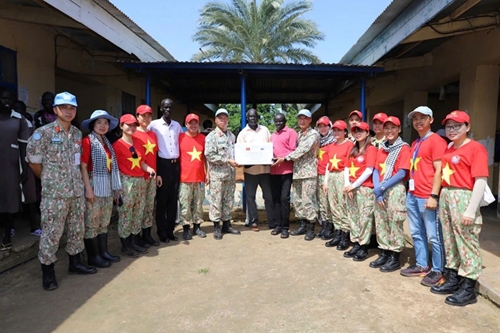In the dry season, the land there is barren while in the rainy season, the roads are muddy or flooded, making it difficult to travel, hindering the economic growth and people are facing many difficulties in life.
    |
 |
|
Vietnam's Engineering Company Rotation 2 presents gifts to Abyei hospital. |
Widespread robbery makes local people afraid so that business activities are not favored. Ethnic and armed conflicts make Abyei increasingly poor. That’s why Vietnamese “blue berets” are present there.
Participating in peacekeeping operations at the United Nations Interim Security Force for Abyei (UNISFA) for more than two years, Vietnamese peacekeeping force has left beautiful images and been appreciated by the government and local people. With the responsibility of Uncle Ho's soldiers and love of peace, the Vietnamese engineers and the working group at the UNISFA have organized a number of activities, including building roads, schools, classrooms, and conducting charity activities at schools and hospitals in Abyei. These activities aim to bring a better life to local people.
With the mentioned contribution, anywhere in the poor land, Uncle Ho’s soldiers have been warmly welcomed. Wherever they go, the Vietnamese blue beret soldiers are always greeted by local people in Vietnamese "Hello" followed by "Vietnam". It is truly touching and proud that Uncle Ho's soldiers of the Vietnam People's Army are loved by all.
There are nine tribes in Abyei. Only after two years of performing U.N. peacekeeping operations in Abyei, Vietnamese soldiers has considered “the tenth tribe.”
Chon Chan-ga, Minister of Peacebuilding and Reconciliation in Abyei, shared that they were deeply grateful for the sentiments and contribution of the Vietnamese soldiers to this land. Even if one day they leave, what they have done will forever be a legacy in Abyei.
The Vietnamese peacekeeping force’s contribution has left deep impression on the heart of the people in Abyei, contributing to spreading the beautiful images of Uncle Ho’s soldiers to the world.
By Senior Captain Pham Thi Mai Ngan from Vietnam’s working group at UNISFA
Translated by Quynh Oanh